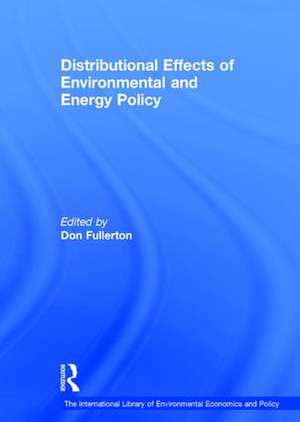Distributional Effects of Environmental and Energy Policy: The International Library of Environmental Economics and Policy
Editat de Don Fullertonen Limba Engleză Hardback – 14 aug 2009
Preț: 1499.60 lei
Preț vechi: 1992.61 lei
-25% Nou
Puncte Express: 2249
Preț estimativ în valută:
286.95€ • 300.21$ • 238.37£
286.95€ • 300.21$ • 238.37£
Comandă specială
Livrare economică 12-26 martie
Doresc să fiu notificat când acest titlu va fi disponibil:
Se trimite...
Preluare comenzi: 021 569.72.76
Specificații
ISBN-13: 9780754627371
ISBN-10: 0754627373
Pagini: 518
Dimensiuni: 174 x 246 mm
Greutate: 2.65 kg
Ediția:1
Editura: Taylor & Francis
Colecția Routledge
Seria The International Library of Environmental Economics and Policy
Locul publicării:Oxford, United Kingdom
ISBN-10: 0754627373
Pagini: 518
Dimensiuni: 174 x 246 mm
Greutate: 2.65 kg
Ediția:1
Editura: Taylor & Francis
Colecția Routledge
Seria The International Library of Environmental Economics and Policy
Locul publicării:Oxford, United Kingdom
Cuprins
Contents: Introduction; Part I Conceptual Overview: A framework to compare environmental policies, Don Fullerton. Part II Costs to Consumers: Is the gasoline tax regressive?, James M. Poterba; Distributional aspects of an environmental tax shift: the case of motor vehicle emissions taxes, Margaret Walls and Jean Hanson; A distributional analysis of green tax reforms, Gilbert E. Metcalf; Distributional effects of alternative vehicle pollution control policies, Sarah E. West; Estimates from a consumer demand system: implications for the incidence of environmental taxes, Sarah E. West and Roberton C. Williams III. Part III Costs to Producers or Factors: An overlapping generations model of growth and the environment, A. John and R. Pecchenino; The general equilibrium incidence of environmental taxes, Don Fullerton and Garth Heutel. Part IV Benefits via Scarcity Rents: A positive theory of environmental quality regulation, Michael T. Maloney and Robert E. McCormick; Distributional effects of carbon allowance trading: how government decisions determine winners and losers, Terry Dinan and Diane Lim Rogers; Are emissions permits regressive?, Ian W.H. Parry; On the (ir)relevance of distribution and labor supply distortion to government policy, Louis Kaplow; Efficiency costs of meeting industry-distributional constraints under environmental permits and taxes, A. Lans Bovenberg, Lawrence H. Goulder and Derek J. Gurney. Part V Benefits of Protection: The distribution of pollution: community characteristics and exposure to air toxics, Nancy Brooks and Rajiv Sethi; A random utility model of environmental equity, Diane Hite; 'Optimal' pollution abatement - whose benefits matter, and how much?, Wayne B. Gray and Ronald J. Shadbegian; Does the value of a statistical life vary with age and health status? Evidence from the US and Canada, Anna Alberini, Maureen Cropper, Alan Krupnick and Nathalie B. Simon; Evidence of environmental migration, Trudy Ann Cameron and Ian T. McConnaha. P
Notă biografică
Don Fullerton is a Professor in the Department of Finance at the University of Illinois, USA
Descriere
The essays in this book bring together the most significant international research on the ways in which environmental and energy policies affect individuals at different levels of income, age, or neighbourhood location. The research considers the consequences of measures that improve air quality, regulations that increase the price of fossil-fuel-intensive products, and policies that hand out pollution permits in the commercial sector.







